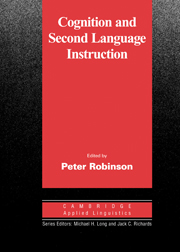Series editors' preface
Published online by Cambridge University Press: 05 October 2012
Summary
Second language acquisition is first and foremost a mental process – one that occurs in a behavioural and social context, to be sure, but fundamentally a matter of acquiring a new knowledge system. Cognition and cognitive factors, therefore, are central to any account of how and why SLA works, or so often fails, and equally central to the theory and practice of second language instruction, given that it is the SLA process that instruction is designed to facilitate.
Section 1 of Professor Peter Robinson's new book, Cognition and Second Language Instruction, offers the reader six detailed surveys of what is thought to be known about some of the cognitive resources, processes and constraints SLA researchers consider most crucial, including attention, memory, automatization, processing, and learnability. Six chapters in Section 2 describe current work in several areas where the models and empirical findings are being drawn upon (and new knowledge often simultaneously created) in the design, delivery and evaluation of second language instruction: task design, task classification and sequencing, the provision of focus on form, intentional and incidental vocabulary learning, syllabus and materials design, individual differences, and protocol analysis. Given the undeniable importance of cognitive factors, the authors in this section explore how best to adapt instruction to putative universals and empirically attested variability in learning processes.
- Type
- Chapter
- Information
- Publisher: Cambridge University PressPrint publication year: 2001

